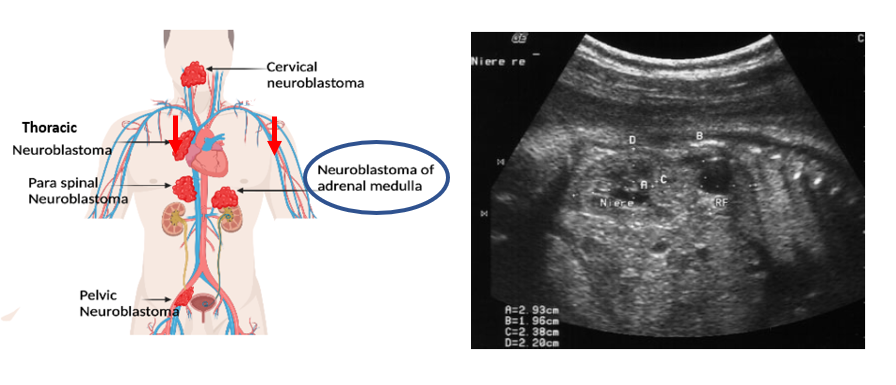This leaflet is to help you understand what Neuroblastoma is, what tests you need, and the implication of being diagnosed for you and your baby.
What is a Neuroblastoma?
Neuroblastoma is a cancer that develops from an overgrowth of immature nerve cells called neuroblasts. It is the most common cancer in newborn babies. It is found in 1/8000 babies. While neuroblastoma can be found anywhere in the body, it is most commonly found in or around the adrenal glands. The adrenal glands sit on top of the kidneys.

The diagram on the left demonstrates the main sites around the body where neuroblastoma can occur. The ultrasound image shows an enlarged adrenal gland containing a tumour. The tumor has a rim of gray tissue and a black circle of fluid in the middle.
How is a neuroblastoma detected?
Most cases of neuroblastoma are identified on ultrasound only in the last third of pregnancy. The adrenal gland may appear larger than expected and contain fluid.
What causes a neuroblastoma?
The exact cause of neuroblastoma is unclear. It is thought that as the nerve cells are forming, they undergo a series of complex changes. Problems at any stage of development can lead to an overgrowth of cells and form a tumour. It is thought that certain exposures around the time of conception may increase the likelihood of tumour formation. These exposures include medications like phenytoin or opiates. Some toxins, viruses and low folic acid intake may also be found. Most patients have no explanation for neuroblastoma.
Should I have more tests done?
- Additional ultrasound scans: Your baby will have additional ultrasound scans to monitor the growth of the baby, to re-evaluate the size and appearance of the mass, and to see if there is any evidence of the spread of the tumor to other organs such as the liver, placenta and umbilical cord.
- Fetal Doppler: The baby may also be screened for evidence of anemia using Doppler ultrasound.
- Fetal echocardiogram: a detailed heart ultrasound may be suggested.
- Fetal MRI: A fetal MRI, may be recommended to look for signs of spread or to confirm the diagnosis. This test may not be necessary in all cases and may not be available in all areas of the world.
What are the things to watch for during pregnancy?
Before birth, your doctor will watch the pregnancy carefully to see how the baby is growing and to monitor the size of the neuroblastoma. Although very rare, babies with neuroblastoma sometimes develop extra swelling of the skin or fluid inside of the baby which is a serious problem called hydrops. This complication can be detected with ultrasound. Unless the baby’s tummy is very large, babies with neuroblastoma can be born vaginally. Occasionally, mothers with babies with neuroblastoma can develop preeclampsia (high blood pressure and protein in the urine), so your doctor will look out for this as well.
What does it mean for my baby after it is born?
After birth, your baby may undergo blood tests and imaging with CT or MRI to confirm the diagnosis and to help plan treatment. If testing shows that your baby has a neuroblastoma, your baby will have appointments with doctors who specialize in caring for babies with cancer. After birth, most neuroblastomas remain the same size, but some disappear without treatment. The good news is that most babies with neuroblastomas do well after treatment.
Will it happen again?
It is unlikely for neuroblastoma to occur again in future pregnancies. In 1-2% of families, neuroblastoma may be due to an inherited genetic problem and can happen again.
What other questions should I ask?
- Does the neuroblastoma seem to be only in the adrenal gland?
- How sure are you that this is a neuroblastoma?
- How often will I have ultrasound examinations done?
- Do you think that I will need to deliver prematurely?
- Do you think that the baby will need treatment during pregnancy?
- Where should I deliver?
- Where will the baby receive the best care after it is delivered?
- Will my baby need surgery after delivery?
- What happens if the cancer starts to spread while I am still pregnant?
- Can I meet the team of doctors that will be assisting my baby when it is born prior to delivery?
Last updated October 2022
